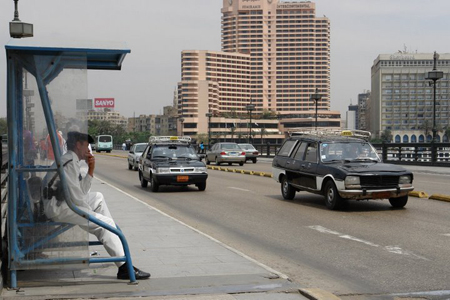
A new report released by the Committee to Protect Journalists (CPJ) tells us that Burma is the worst place in the world to be a blogger.
Next on the list of countries notorious for clever intimidation techniques are the Middle East and North Africa candidates: Iran, Syria, Saudi Arabia and Tunisia.
I’ve just returned from Egypt, ranked 10th on the CPJ list. After my Cairo conversations with young journalists and artists, I also realized how difficult it still is to walk the thin line between the state and religious authorities in this country. Even with this, bloggers and internet artists dare to voice what they think.
Take Mohammed A. Fahmy for example, leader of the Ganzeer art project in Cairo. In his work he does not refrain from criticizing both the government and the societal or religious constraints ruling his country. Referring to a cover from a December 2004 Cairo youth magazine, illustrating the many “fine” inventions of Arab civilization, one of which is the “presidential monarchy,” I asked Mohammed: “How critical can you afford to be?”
“As critical as it gets,” he said.
Citizen journalism and artistic creation presuppose freedom of speech. Bloggers report, artists depict. Mohammed is one of those young critical voices that won’t be intimidated.
And yet, the role of intimidation remains strong in Egypt; in every aspect of life where opinions are to be voiced. A few fall prey to the oppressive state mechanisms: detention, hearings and weeks under state observation. These serve as warnings for all other critical voices out there.
As the CPJ report points out, in these countries it is enough to jail a few bloggers to intimidate the rest. It’s an oblation given for criticism and analysis to continue.
Yet even in these countries, censorship rules will not prevail. Technological advances are with the young and connected. Therefore, censors will lose the race.
In this article from the ISN Digital Library you can read how the new Arab media challenges the militaries. Also, you might want to check our Security Watch news stories, about the limits of Egypt’s cyberactivism, the Bahraini blogosphere and about how blogs and Internet forums debate political issues in Russia.

